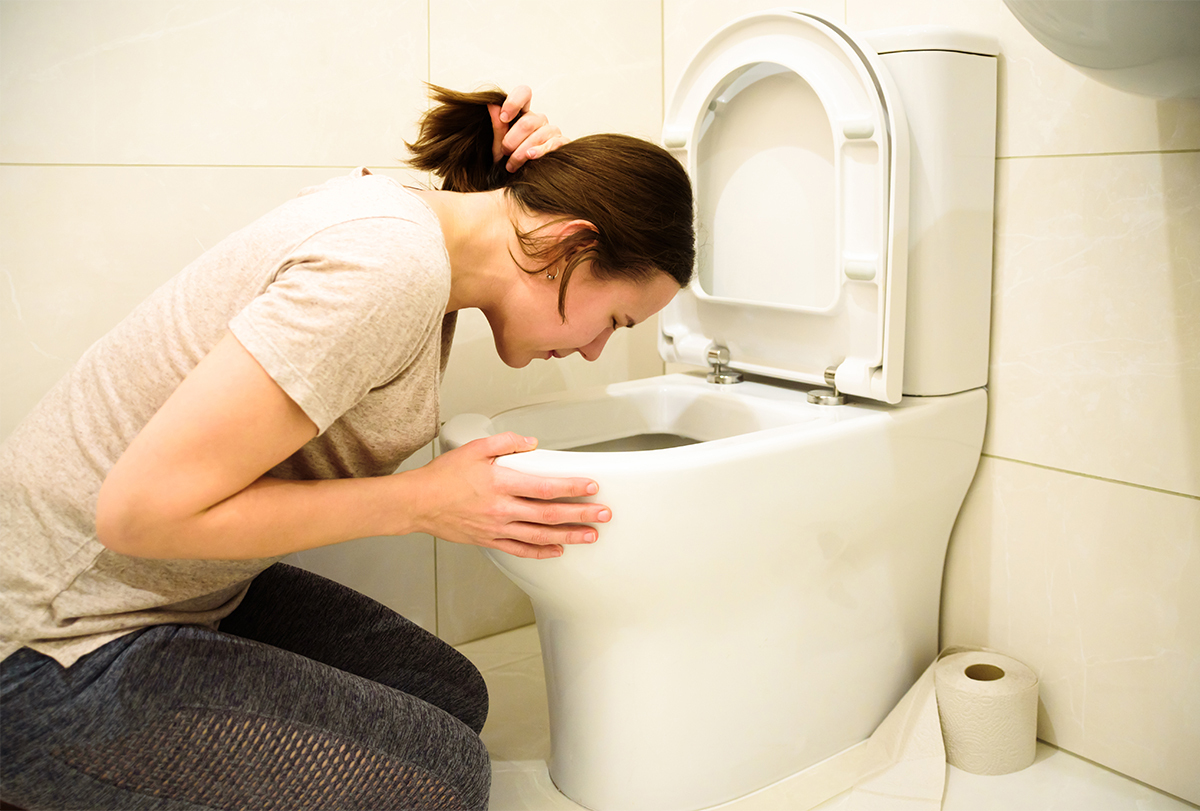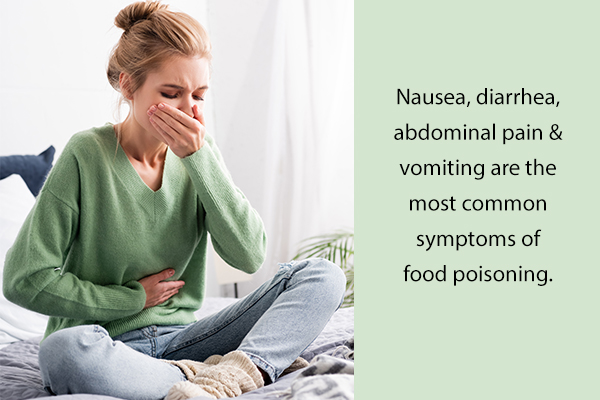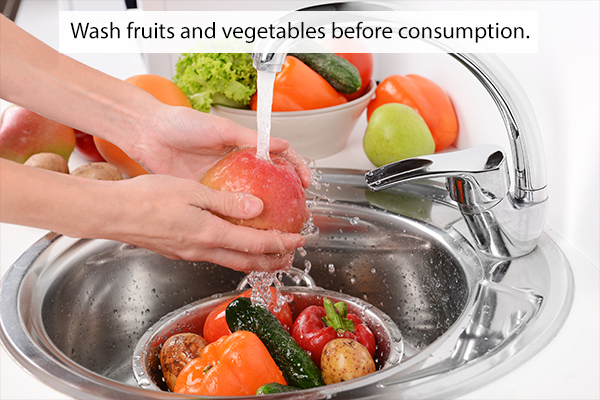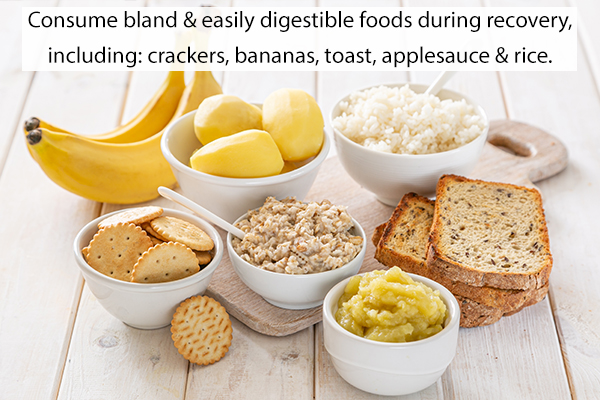In this article:
Food poisoning is an illness caused by consuming food or liquids that contain germs, including bacteria, parasites, and viruses. These microorganisms cannot be detected by seeing, tasting, or smelling and are, therefore, unknowingly consumed frequently.

Once inside the body, these germs release poisonous toxins, which can cause vomiting and diarrhea. The symptoms of food poisoning may last for 1–3 days. However, some severe types of food poisoning may persist for longer.
It is estimated that food poisoning can cause up to 128,000 hospitalizations and 3,000 deaths every year, according to the Centers for Disease Control and Prevention. (1)
Causes of Food Poisoning
One of the most common causes of food poisoning is norovirus. The common bacteria that cause food poisoning are Salmonella and Escherichia coli.
The majority of food poisoning cases are caused by viruses, while bacterial causes are responsible for the more severe symptoms (fever, bloody stool, etc.).
Food can be contaminated with these microbes in various ways:
- People who are sick and who prepare the food can transmit infectious diseases when they do not use proper hand hygiene before making the food.
- Germs can also live on the food, and if it is not prepared, washed, or cooked properly, it can infect consumers.
- Germs from one food item can easily spread to other items if they are prepared on the same surfaces or with the same hands as contaminated foods.
- Using the same utensils on contaminated food can spread the germs to other food items.
The most common food items associated with food poisoning include dairy, leafy vegetables, fruits and nuts, vine or stalk vegetables, poultry, eggs, pork, beef, beans, grains, and root vegetables.
Symptoms of Food Poisoning

The signs of food poisoning are dependent on your general health and the causative microorganism. However, the most common symptoms are usually gastrointestinal in nature, including:
These symptoms can occur nearly immediately after eating the contaminated food up until days or weeks later.
Other symptoms of food poisoning include:
- Fever
- Bloody stools
- Dehydration due to excessive vomiting or diarrhea
Treatment for Food Poisoning

The treatment for different food-borne illnesses depends on the symptoms they manifest.
Since diarrhea and vomiting are the most common consequences of food poisoning, the treatment aims at replacing body fluids and electrolytes to prevent dehydration. This involves:
- Increased fluid intake
- Oral rehydration solution (ORS) if diarrhea is severe
- Consumption of saltine crackers to help replenish electrolytes
- Loperamide or bismuth salicylate for adults having diarrhea
- Antibiotics if the food poisoning is caused by bacteria or parasites
- Nausea-suppressing medications if the symptoms persist for more than a day
- Intravenous fluids and hospitalization for severe cases
- Do not give any OTC medication to your children without a doctor’s consultation.
- Avoid giving ORS to infants unless prescribed by a doctor. Instead, feed them with breast milk or formula.
- According to the CDC, sports drinks such as Gatorade should not be used as a replacement for ORS for the treatment of diarrhea. (2)
Diagnosing Food Poisoning
Food poisoning can be easily diagnosed through its symptoms, requiring no additional tests. However, if the problem is severe, the following may be performed:
- Medical history
- Physical exam
- Blood tests
- Stool tests
- Additional tests for ruling out other complications or health problems
The stool sample helps in determining the causative organism. Additionally, the contaminated food may be examined to identify the toxin or microbe if required.
Home Remedies to Ward Off Symptoms
The following home remedies are unlikely to address the root cause of food poisoning but can provide some degree of digestive relief by curbing its symptoms.
1. Drink ginger tea
Ginger (Zingiber officinale) is often recommended for managing a whole range of gastrointestinal problems, such as excess gas, nausea, abdominal pain, indigestion, and bloating, all of which occur in the wake of food poisoning.
The digestive merits of ginger are much talked about, but the exact mechanism responsible for these effects is still unclear. (3) You can sip on some ginger tea when suffering from food poisoning to optimize the aforementioned benefits.
2. Take probiotics
Probiotics are beneficial strains of bacteria that help restore or maintain a healthy gut microbiota and enhance digestive functioning in various ways. (4) They are available in two forms:
- Foods, such as yogurt, kefir, and sauerkraut, which should be included in your regular diet.
- Supplements, which should be taken in the correct dosage to achieve the desired results without any side effects.
Probiotics have been found safe and effective in reducing the digestive distress associated with irritable bowel syndrome (IBS) as well as the diarrheal bouts that occur as a side effect of antibiotic treatment or H. pylori eradication therapy. (5)
This strengthens the case for using probiotics to alleviate similar symptoms associated with food poisoning.
3. Drink peppermint tea
Peppermint tea has been used as a therapeutic dietary aid for alleviating nausea. This herb is known for its refreshing smell, which has a significant calming effect on the body, even if it is for a temporary period.
No wonder peppermint is one of the most widely used herbs in aromatherapy. Inhaling its soothing minty vapors can help settle your digestive unrest and soothe your senses to relieve nausea and vomiting.
Multiple studies have demonstrated the benefits of peppermint aromatherapy on reducing both general and pregnancy-related nausea and vomiting. (6)(7)
Self-Care Tips to Prevent Food Poisoning

Prevention is key in the management of food poisoning and its symptoms. Here are some useful tips:
- Wash your hands thoroughly after using the bathroom, touching high-traffic surfaces (handrails, counters, phones, etc.), and human contact (handshaking, hugging, etc.). Washing your hands after changing diapers, touching animals, blowing your nose, or handling waste is also just as important.
- Be smart about food safety. Use warm soapy water to clean the utensils, surfaces, and cutting boards used while preparing food. Wash fruits and vegetables before consumption.
- Keep the fridge cooler than 40°F and the freezer below 0°F.
- Avoid undercooked meat, raw eggs, smoked or raw seafood, unpasteurized products, soft cheese, prepared salads, hot dogs, and luncheon meats, especially if you are pregnant.
- Assess the quality of your food. Knowing your food is contaminated is nearly impossible if you or your close contacts are not symptomatic. However, the following tips may be useful:
- Being cognizant of where the food has been (in contact with raw meat or a contaminated surface) and how it feels, looks, and smells is the obvious way to have a hint if it is contaminated.
- Do not leave refrigerated food items at room temperature or in the sun for prolonged periods.
- Look at the food for texture, smell the food for sour or spoiled odors, and feel the food for temperature.
- Stay home from work or school if you suspect food poisoning.
- OTC anti-diarrheal medications can be helpful, and they include Imodium, Lomotil, and Pepto-Bismol. However, if you have persistent fevers or blood in your stool or vomit, avoid these medications, and seek medical care.
- Stay hydrated. After contracting food poisoning, it can be challenging to find relief from diarrhea, chills, and dehydration. As with most things medical, hydration is critical.
- Eat small meals that have low-fat content.
Suitable Diet for Recovery From Food Poisoning

It is suggested to consume ample fluids and refrain from having solid foods or dairy products until diarrhea and vomiting resolves. Once these symptoms subside, you may gradually increase the uptake of solid food.
Consume bland and easily digestible foods during recovery, including:
- Crackers
- Bananas
- Toast
- Applesauce
- Rice
The following things should be avoided:
- Spicy foods
- Fried foods
- Dairy
- High-fat and sugary foods
- High-fiber foods
- Caffeine
Risk Factors for Food Poisoning
Food poisoning, specifically caused by viruses, can easily spread from one person to another. This is commonly seen in circumstances where people are forced to share close spaces, such as cruise ships, classrooms, and nursing homes.
However, some individuals are at a greater risk of developing long-term complications due to food poisoning, including:
- People with a weak immune system and chronic health conditions, such as kidney disease, diabetes, HIV/AIDS, and cancer (8)
- Elderly people
- Infants and young children
Complications Associated With Food Poisoning
Food poisoning can be troublesome, but it usually resolves on its own in a couple of days, with no lasting complications. (9) However, some severe cases can cause dehydration due to loss of water and electrolyte imbalance in the body, often requiring medical attention.
When to See a Doctor
Food poisoning is common, generally not requiring medical attention. However, it is suggested that the following groups seek medical care if any related symptoms are experienced:
- Infants and young children
- Pregnant women
- Elderly individuals
- People with a compromised immune system
Regardless, anyone with the following severe symptoms should visit a doctor:
- Bloody stools
- Fever over 102°F
- Frequent vomiting, causing an inability to keep liquids down
- Dehydration symptoms, including dry mouth and throat, dizziness, and lack of urination
- Diarrhea persistent for 3 days or more
Final Word
Bacteria that cause food poisoning have a quick multiplication rate, making food poisoning a common problem. Thus, it is necessary to cook your food well and handle it properly while storing or serving.
People belonging to high-risk groups such as the elderly, young children, and pregnant women, should take extra care of their food sources and types. It is vital to consult a doctor if any symptoms of food poisoning manifest.
- Was this article helpful?
- YES, THANKS!NOT REALLY


